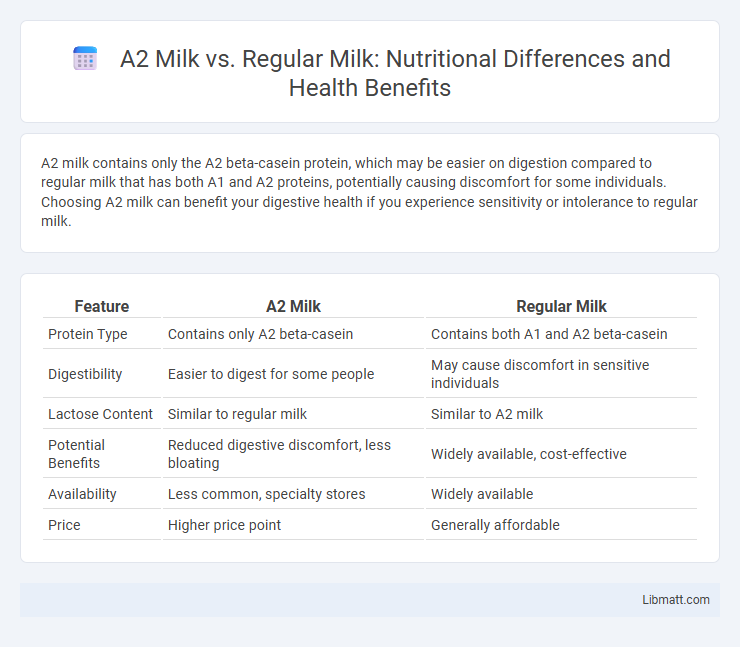A2 milk contains only the A2 beta-casein protein, which may be easier on digestion compared to regular milk that has both A1 and A2 proteins, potentially causing discomfort for some individuals. Choosing A2 milk can benefit your digestive health if you experience sensitivity or intolerance to regular milk.
Table of Comparison
| Feature | A2 Milk | Regular Milk |
|---|---|---|
| Protein Type | Contains only A2 beta-casein | Contains both A1 and A2 beta-casein |
| Digestibility | Easier to digest for some people | May cause discomfort in sensitive individuals |
| Lactose Content | Similar to regular milk | Similar to A2 milk |
| Potential Benefits | Reduced digestive discomfort, less bloating | Widely available, cost-effective |
| Availability | Less common, specialty stores | Widely available |
| Price | Higher price point | Generally affordable |
Understanding the Basics: What Is A2 Milk?
A2 milk contains only the A2 type of beta-casein protein, which is believed to be easier to digest compared to the A1 protein found in regular milk. Unlike regular milk that has a mix of both A1 and A2 proteins, A2 milk comes from cows bred specifically to produce only the A2 variant. Understanding this distinction can help you choose milk that may reduce digestive discomfort and promote better gut health.
Regular Milk: Composition and Characteristics
Regular milk primarily contains A1 beta-casein protein alongside lactose, fat, vitamins, and minerals, contributing to its creamy texture and nutritional profile. It typically includes around 3.5% fat, 3.3% protein, and essential nutrients like calcium, vitamin D, and B vitamins. The presence of A1 beta-casein may influence digestion and has been linked to certain gastrointestinal discomforts in sensitive individuals.
Key Differences Between A2 Milk and Regular Milk
A2 milk contains only the A2 beta-casein protein, whereas regular milk typically contains both A1 and A2 beta-casein proteins, which can affect digestion and cause discomfort in some individuals. Studies suggest A2 milk may be easier on the digestive system, potentially reducing symptoms like bloating and gas compared to regular milk. You may find A2 milk a suitable alternative if you experience digestive issues associated with regular milk consumption.
Health Benefits of A2 Milk
A2 milk contains only the A2 beta-casein protein, which may reduce digestive discomfort and inflammation compared to regular milk containing both A1 and A2 proteins. Studies suggest that consuming A2 milk can improve gut health by preventing symptoms like bloating, gas, and diarrhea commonly associated with lactose sensitivity. Choosing A2 milk could enhance your digestive well-being, especially if you experience discomfort after drinking regular milk.
Digestive Impact: A2 Milk vs Regular Milk
A2 Milk contains only the A2 beta-casein protein, which is easier to digest for many people compared to the A1 beta-casein found in regular milk, reducing the likelihood of digestive discomfort such as bloating and gas. Studies indicate that A2 Milk may cause fewer gastrointestinal symptoms in individuals with mild milk intolerance, improving overall gut health and comfort. In contrast, regular milk's A1 beta-casein can produce peptides that might trigger inflammation and digestive distress in sensitive individuals.
Nutritional Value Comparison
A2 milk contains the same essential nutrients as regular milk, including calcium, protein, and vitamins D and B12, but differs in the type of beta-casein protein present, featuring only the A2 variant. This variation may make A2 milk easier to digest for individuals sensitive to the A1 protein, potentially reducing gastrointestinal discomfort like bloating and indigestion. Your choice between A2 and regular milk can impact digestion comfort while maintaining comparable nutritional benefits.
Lactose Intolerance and Milk Choices
A2 milk contains only the A2 beta-casein protein, which may be easier for people with lactose intolerance to digest compared to regular milk that contains both A1 and A2 proteins. Your choice between A2 milk and regular milk can impact digestive comfort, as some studies suggest A2 milk reduces symptoms like bloating and gas in lactose-intolerant individuals. Selecting A2 milk may provide a suitable alternative for those seeking milk options that align better with lactose sensitivity.
Availability and Cost Analysis
A2 Milk is typically available in specialty stores and premium supermarket sections, whereas regular milk is widely accessible in nearly all grocery stores. The cost of A2 Milk is generally higher, averaging 30-50% more than regular milk due to specialized breeding and processing requirements. Consumers often weigh this price difference against perceived health benefits when choosing between A2 Milk and regular milk options.
Consumer Preferences and Market Trends
Consumer preferences increasingly favor A2 milk due to its potential digestive benefits and perceived natural quality, driving significant market growth globally. Market trends indicate rising demand from health-conscious consumers seeking alternatives to regular milk, with A2 milk brands expanding retail presence and online availability. Your choice between A2 milk and regular milk may be influenced by digestive comfort, nutritional awareness, and emerging scientific insights shaping consumer behavior.
Which Milk Should You Choose?
A2 milk contains only the A2 beta-casein protein, which may reduce digestive discomfort for individuals sensitive to regular milk's A1 protein. Studies suggest that choosing A2 milk can help minimize symptoms like bloating and gas, making it a suitable alternative for those with mild lactose intolerance or milk protein sensitivity. Regular milk offers a broader nutrient profile at a typically lower cost, but A2 milk is ideal for consumers seeking easier digestion and improved gut health.
A2 Milk vs Regular Milk Infographic

 libmatt.com
libmatt.com